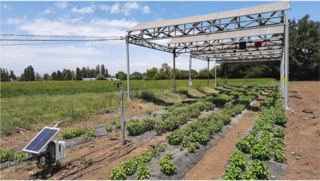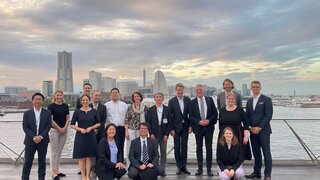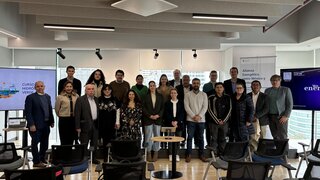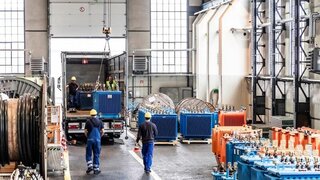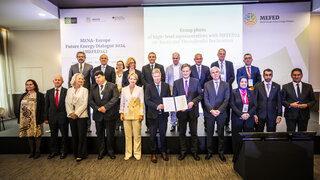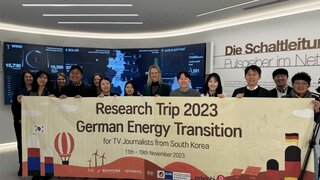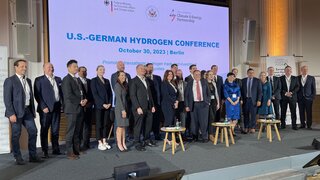Towards an Efficient and Green Energy System in Cities
The Sino-German Energy Partnership (EP) supports the energy transition in industry and cities by showcasing energy efficiency practices in pilot industrial parks. Multi-stakeholder engagement demonstrated effective cooperation in advancing climate neutrality and facilitated market opportunities for German green solutions.
Background
The decarbonisation of cities, which generate approximately 70% of global greenhouse gas (GHG) emissions, is essential for a successful energy transition. In Germany as well as in China, many cities, urban districts and industrial parks are striving to transform their local energy supply system, aiming for sustainable development by enhancing energy efficiency and leveraging green solutions.
Both Germany and China agreed on implementing Demonstration Projects on Energy Efficiency in Industry and Cities with a Joint Declaration of Intent, which was signed in 2016 at the 3rd Working Group Meeting on Energy Efficiency between the German Federal Ministry for Economic Affairs and Climate Action (BMWK) and the National Development and Reform Commission (NDRC).
In June 2023, Minister Robert Habeck of BMWK and Chairman Zheng Shanjie of NDRC, on behalf of the German and Chinese governments, signed the Joint Declaration of Intent on the Establishment of a Dialogue- and Cooperation Mechanism on Climate Change and the Green Transformation. This strengthened the Sino-German cooperation on energy efficiency in districts and in key industries such as cement industry and industry parks.
Challenge and Goal
In China, industrial parks contribute 31% of total carbon emissions, indicating a huge potential for decarbonization. Increasing energy efficiency and reducing emissions is challenging due to high energy intensity, rigid infrastructure, and lack of innovation. Achieving this requires strong policy support, advanced solutions, and stakeholder collaboration. The Energy Partnership aims to drive green transition through integrated approaches in pilot parks, engaging German businesses to implement cost-effective, low-carbon solutions.
Action taken
Through the Sino-German demonstration efforts, a methodology package based on German best practices was developed to support urban districts and industrial parks to achieve climate goals. In the pilot park “Jintan Economic Development Zone” in Jiangsu Province, an integrated energy efficiency concept was developed to guide its green transition. It provided a comprehensive analysis of local energy demand and supply, exploring renewable energy expansion and energy efficiency potentials and suggested a list of measures.

The pilot park selected measures on building energy efficiency to implement in a pilot building. By adopting the German Sustainable Building Council (DGNB) standard and installing heat pumps provided by a German company as well as building-integrated photovoltaics (BIPV), the pilot building serves as a lighthouse project for sustainable buildings in China. An exchange of think tank experts from both countries provided guidance to ensure the effectiveness of the BIPV solution for renewable energy supply. Furthermore, a micro-grid pilot by State Grid Jintan showcases innovative methods for decentralised renewable integration. Through knowledge sharing on Sino-German pilot practices on the Energy Efficiency Network (EEN) in the neighboring Taicang Industrial Park, awareness of innovative management tools was raised.
Impact
The integrated energy concept of the pilot park shows that CO2 emissions could be reduced by 42% by 2060 compared to 2021, contributing to the park’s climate neutral future. The applied green solutions provide measurable outcomes and showcase best practises to save energy, expand renewables and reduce emissions in industrial parks.
According to forecasted values from the certification body, the pilot building, by adopting the DGNB standard, is expected to save 10% to 15% energy consumption annually more than by following the Chinese Green-3-Stars-Standards. Further calculations by the supplier show that the two installed air-sourced heat pumps in the pilot building will save 42 MWh energy and cut CO2 emissions by 23.7 t annually. The BIPV solution, currently applied across two floors, will supply 25 MWh of electricity annually. If applied to the whole pilot building, it would provide 283 MWh of electricity annually, reducing 158 t of CO2 emissions. This further supports the local and central government in creating climate neutrality policies and guidelines for industrial parks, driving green transformations.
Through the multi-stakeholder approach, German companies with established business in China were able to participate in a public tender and selected as green solution providers. This increased the recognition of German small and medium-sized companies with green transition solutions and created fairer market access conditions for German companies.
By disseminating the pilot practices to other cities and industrial parks across China (the country aims to pilot 100 carbon peaking and carbon neutral industrial parks), it enables more regions to adopt proven strategies for their effective energy transition and decarbonisation. Beijing Fengtai Industrial Park, host of a road show in August 2024, shows great motivation to introduce similar measures. It also increased the awareness on the DGNB standard, as the project team receives inquiries to connect with the DGNB GmbH.
